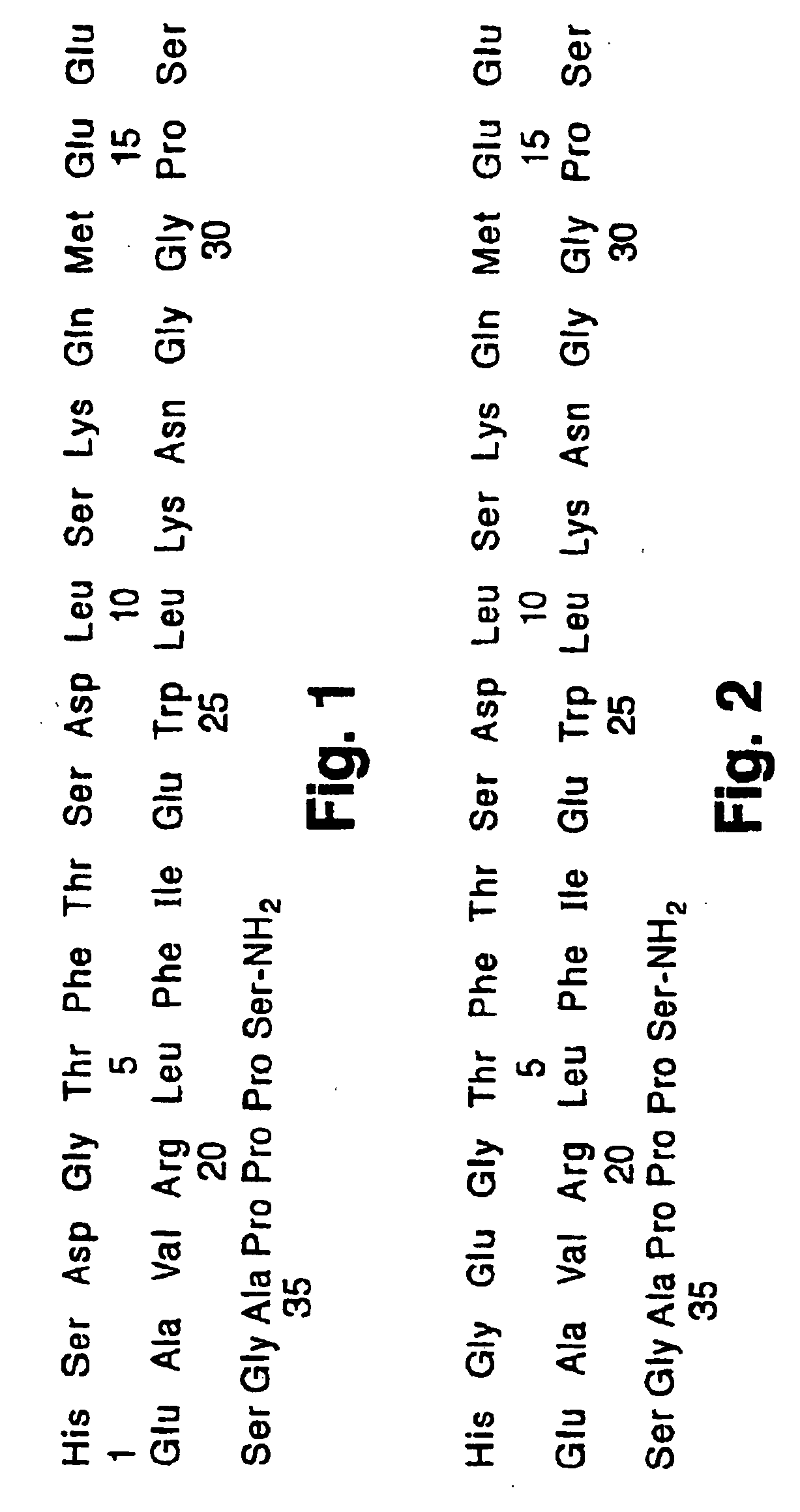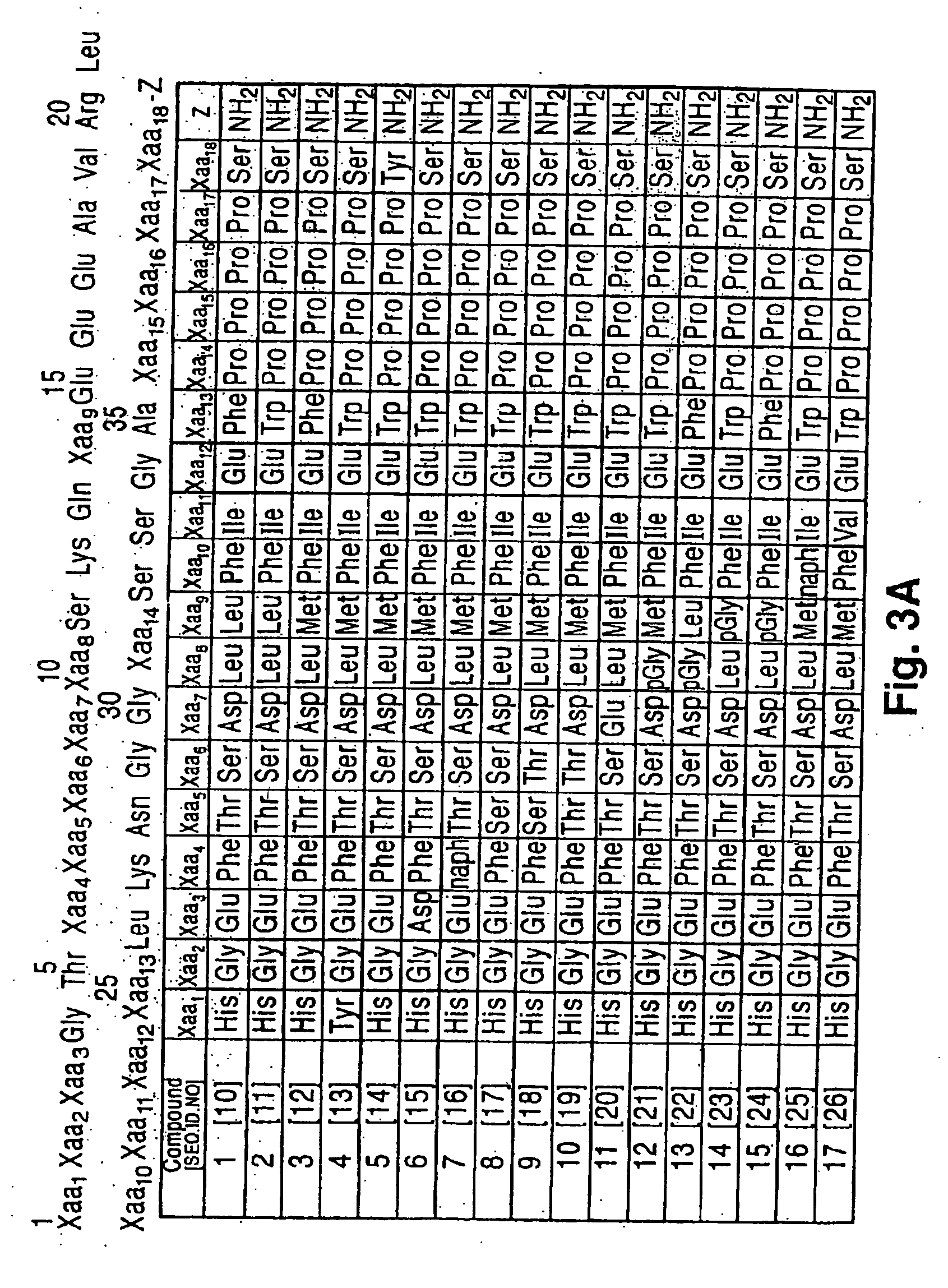Exendin analog formulations
- Summary
- Abstract
- Description
- Claims
- Application Information
AI Technical Summary
Benefits of technology
Problems solved by technology
Method used
Image
Examples
example 1
Preparation of Exendin-3
His Ser Asp Gly Thr Phe Thr Ser Asp Leu Ser Lys Gln Met Glu Glu Glu Ala Val Arg Leu Phe Ile Glu Trp Leu Lys Asn Gly Gly Pro Ser Ser Gly Ala Pro Pro Pro Ser-NH2 [SEQ. ID. NO. 1]
[0510] The above amidated peptide was assembled on 4-(2′-4′-dimethoxyphenyl)-Fmoc aminomethyl phenoxy acetamide norleucine MBHA resin (Novabiochem, 0.55 mmole / g) using Fmoc-protected amino acids (Applied Biosystems, Inc.). In general, single-coupling cycles were used throughout the synthesis and Fast Moc (HBTU activation) chemistry was employed. Deprotection (Fmoc group removal) of the growing peptide chain was achieved using piperidine. Final deprotection of the completed peptide resin was achieved using a mixture of triethylsilane (0.2 mL), ethanedithiol (0.2 mL), anisole (0.2 mL), water (0.2 mL) and trifluoroacetic acid (15 mL) according to standard methods (Introduction to Cleavage Techniques, Applied Biosystems, Inc.) The peptide was precipitated in ether / water (50 mL) and centri...
example 2
Preparation of Exendin-4
His Gly Glu Gly Thr Phe Thr Ser Asp Leu Ser Lys Gln Met Glu Glu Glu Ala Val Arg Leu Phe Ile Glu Trp Leu Lys Asn Gly Gly Pro Ser Ser Gly Ala Pro Pro Pro Ser-NH2 [SEQ. ID. NO. 2]
[0513] The above amidated peptide was assembled on 4-(2′-4′-dimethoxyphenyl)-Fmoc aminomethyl phenoxy acetamide norleucine MBHA resin (Novabiochem, 0.55 mmole / g) using Fmoc-protected amino acids (Applied Biosystems, Inc.), cleaved from the resin, deprotected and purified in a similar way to Exendin-3 as describe in Example 1. Used in analysis were Solvent A (0.1% TFA in water) and Solvent B (0.1% TFA in ACN). Analytical RP-HPLC (gradient 36% to 46% Solvent B in Solvent A over 30 minutes) of the lyophilized peptide gave product peptide having an observed retention time of 14.9 minutes. Electrospray Mass Spectrometry (M): calculated 4186.6; found 4186.0 to 4186.8 (four lots).
example 3
Clearance by the Kidney
[0514] The kidney can play a major role in the elimination of some molecules (drugs, peptides, proteins). For some molecules, this process begins when the kidney filters the blood at the glomerulus to produce the ultrafiltrate described below. The glomerular filter discriminates not only on the basis of molecular weight but also by acting as a negatively charged selective barrier, promoting retention of anionic compounds. The free fraction of molecules in the plasma (not protein bound) with a molecular weight less than 5 kD and an effective radii less than 15 Å are easily filtered. For larger molecular weight molecules they are filtered on a more restrictive and limited basis, principally by molecular size, structure and net charge. The cutoff point for glomerular filtration lies between albumin (67 kD) which is retained and hemoglobin (68 kD) which is filtered. Albumin, with an effective radius of about 36 Å is filtered less than 1% at the glomerulus.
[0515]...
PUM
| Property | Measurement | Unit |
|---|---|---|
| Fraction | aaaaa | aaaaa |
| Dimensionless property | aaaaa | aaaaa |
| Dimensionless property | aaaaa | aaaaa |
Abstract
Description
Claims
Application Information
 Login to View More
Login to View More - R&D
- Intellectual Property
- Life Sciences
- Materials
- Tech Scout
- Unparalleled Data Quality
- Higher Quality Content
- 60% Fewer Hallucinations
Browse by: Latest US Patents, China's latest patents, Technical Efficacy Thesaurus, Application Domain, Technology Topic, Popular Technical Reports.
© 2025 PatSnap. All rights reserved.Legal|Privacy policy|Modern Slavery Act Transparency Statement|Sitemap|About US| Contact US: help@patsnap.com



